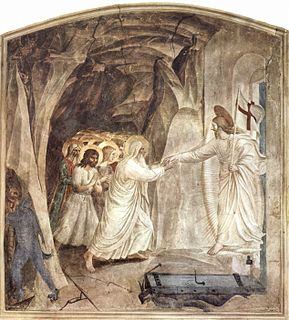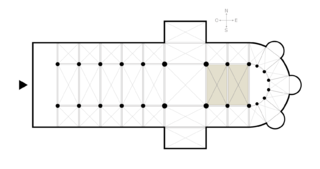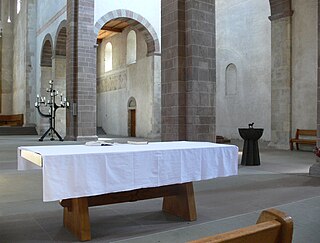Full communion is a communion or relationship of full understanding among different Christian denominations that share certain essential principles of Christian theology. Views vary among denominations on exactly what constitutes full communion, but typically when two or more denominations are in full communion it enables services and celebrations, such as the Eucharist, to be shared among congregants or clergy of any of them with the full approval of each.

In Western Christian theology, grace has been defined, not as a created substance of any kind, but as "the love and mercy given to us by God because God desires us to have it, not necessarily because of anything we have done to earn it", "Grace is favour, the free and undeserved help that God gives us to respond to his call to become children of God, adoptive sons, partakers of the divine nature and of eternal life." It is understood by Christians to be a spontaneous gift from God to people "generous, free and totally unexpected and undeserved" – that takes the form of divine favor, love, clemency, and a share in the divine life of God.

Confession, in many religions, is the acknowledgment of one's sins (sinfulness) or wrongs.

Penance is repentance of sins as well as an alternate name for the Catholic, Eastern Orthodox, and Oriental Orthodox sacrament of Reconciliation or Confession. It also plays a part in confession among Anglicans and Methodists, in which it is a rite, as well as among other Protestants. The word penance derives from Old French and Latin paenitentia, both of which derive from the same root meaning repentance, the desire to be forgiven. Penance and repentance, similar in their derivation and original sense, have come to symbolize conflicting views of the essence of repentance, arising from the controversy as to the respective merits of "faith" and "good works". Word derivations occur in many languages.

The altar rail is a low barrier, sometimes ornate and usually made of stone, wood or metal in some combination, delimiting the chancel or the sanctuary and altar in a church, from the nave and other parts that contain the congregation. Often a gate, or just a gap, at the centre divides the line into two parts. Rails are a very common, but not inevitable, feature of Roman Catholic, Anglican, Lutheran, and Methodist churches. They are usually about two feet 6 inches high, with a padded step at the bottom, and designed so that the wider top of the rail can support the forearms or elbows of a kneeling person.

In Christian theology, justification is God's act of removing the guilt and penalty of sin while at the same time making a sinner righteous through Christ's atoning sacrifice.

Open communion is the practice of some Protestant Churches of allowing members and non-members to receive the Eucharist. Many but not all churches that practice open communion require that the person receiving communion be a baptized Christian, and other requirements may apply as well. In Methodism, open communion is referred to as the open table.
Sanctification is the act or process of acquiring sanctity, of being made or becoming holy.
Christian perfection is the name given to various teachings within Christianity that describe the process of achieving spiritual maturity or perfection. The ultimate goal of this process is union with God characterized by pure love of God and other people as well as personal holiness or sanctification. Various terms have been used to describe the concept, such as "Christian holiness", "entire sanctification", "perfect love", the "baptism with the Holy Spirit", the "second work of grace", and the "second blessing".

Eucharistic theology is a branch of Christian theology which treats doctrines concerning the Holy Eucharist, also commonly known as the Lord's Supper. It exists exclusively in Christianity and related religions, as others generally do not contain a Eucharistic ceremony.

A choir, also sometimes called quire, is the area of a church or cathedral that provides seating for the clergy and church choir. It is in the western part of the chancel, between the nave and the sanctuary, which houses the altar and Church tabernacle. In larger medieval churches it contained choir-stalls, seating aligned with the side of the church, so at right-angles to the seating for the congregation in the nave. Smaller medieval churches may not have a choir in the architectural sense at all, and they are often lacking in churches built by all denominations after the Protestant Reformation, though the Gothic Revival revived them as a distinct feature.
Catholicity or catholicism is a concept that encompasses the beliefs and practices of numerous Christian denominations, most notably those that describe themselves as Catholic in accordance with the Four Marks of the Church, as expressed in the Nicene Creed of the First Council of Constantinople in 381: "[I believe] in one, holy, catholic, and apostolic Church."

Anglican eucharistic theology is diverse in practice, reflecting the comprehensiveness of Anglicanism. Its sources include prayer book rubrics, writings on sacramental theology by Anglican divines, and the regulations and orientations of ecclesiastical provinces. The principal source material is the Book of Common Prayer, specifically its eucharistic prayers and Article XXVIII of the Thirty-Nine Articles. Article XXVIII comprises the foundational Anglican doctrinal statement about the Eucharist, although its interpretation varies among churches of the Anglican Communion and in different traditions of churchmanship such as Anglo-Catholicism and Evangelical Anglicanism.

The Divine Service is a title given to the Eucharistic liturgy as used in the various Lutheran churches. It has its roots in the pre-Tridentine Mass as revised by Martin Luther in his Formula missae of 1523 and his Deutsche Messe of 1526. It was further developed through the Kirchenordnungen of the sixteenth and seventeenth centuries that followed in Luther's tradition.
The Evangelical Lutheran Free Church (UAC) is an orthodox Lutheran Church holding to the teachings of the Unaltered Augsburg Confession (UAC). The ELFC-UAC is both evangelical. proclaiming the free forgiveness of sins through faith in Jesus Christ) and sacramental,centering its spiritual life in the regenerating waters of baptism and the real presence of Christ in the Eucharistin Holy Communion.

Wesleyanism, or Wesleyan theology, is a movement of Protestant Christians who seek to follow the "methods" or theology of the eighteenth-century evangelical reformers John Wesley and his brother Charles Wesley. More broadly, it refers to the theological system inferred from the various sermons, theological treatises, letters, journals, diaries, hymns, and other spiritual writings of the Wesleys and their contemporary coadjutors such as John William Fletcher.

Communion table or Lord's table are terms used by many Protestant churches—particularly from Reformed, Baptist and low church Anglican and Methodist bodies—for the table used for preparation of Holy Communion. These churches do not use the term "altar" because they do not see Communion as sacrificial in any way.

In the Lutheran Church, Confession is the method given by Christ to the Church by which individual men and women may receive the forgiveness of sins; according to the Large Catechism, the "third sacrament" of Holy Absolution is properly viewed as an extension of Holy Baptism.

According to some Christian traditions, a second work of grace is a transforming interaction with God which may occur in the life of an individual Christian. The defining characteristics of this event are that it is separate from and subsequent to salvation, and that it brings about significant changes in the life of the believer.












